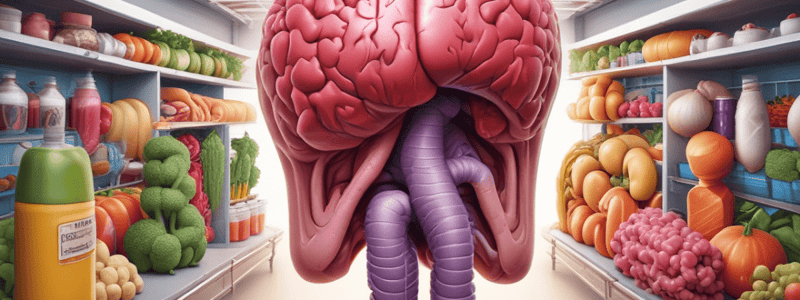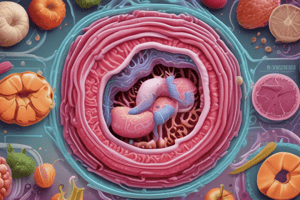Podcast
Questions and Answers
What is the primary function of the mucosal barrier in the stomach?
What is the primary function of the mucosal barrier in the stomach?
- To facilitate the mechanical digestion of food
- To regulate stomach emptying
- To protect the stomach wall from the acidic environment (correct)
- To secrete hydrochloric acid
What is the main reason for the development of a stomach ulcer?
What is the main reason for the development of a stomach ulcer?
- Excessive secretion of gastric enzymes
- Infection with the H. pylori bacteria or use of NSAIDs (correct)
- Failure of the mechanical digestion process
- Decreased production of intrinsic factor
What is the primary function of hydrochloric acid in the stomach?
What is the primary function of hydrochloric acid in the stomach?
- To activate salivary amylase
- To regulate the emptying of the stomach
- To break down proteins through the action of pepsin (correct)
- To maintain the mucosal barrier and protect the stomach wall
What is the purpose of the intrinsic factor produced in the stomach?
What is the purpose of the intrinsic factor produced in the stomach?
What is the purpose of the gastric phase of digestion?
What is the purpose of the gastric phase of digestion?
What is the main function of the mechanical digestion process in the stomach?
What is the main function of the mechanical digestion process in the stomach?
What is the main function of pancreatic juice in the digestive process?
What is the main function of pancreatic juice in the digestive process?
Which of the following nutrients can the body not break down and absorb?
Which of the following nutrients can the body not break down and absorb?
Where does the majority of carbohydrate digestion and absorption occur?
Where does the majority of carbohydrate digestion and absorption occur?
What is the primary function of the gallbladder in the digestive system?
What is the primary function of the gallbladder in the digestive system?
Where is the majority of protein digestion and absorption completed?
Where is the majority of protein digestion and absorption completed?
What is the primary mechanism by which the body absorbs minerals and electrolytes?
What is the primary mechanism by which the body absorbs minerals and electrolytes?
What is the role of the stomach in the digestive process?
What is the role of the stomach in the digestive process?
What is the function of the pancreas in digestion?
What is the function of the pancreas in digestion?
Which organ releases intrinsic factor for vitamin B12 absorption in the small intestine?
Which organ releases intrinsic factor for vitamin B12 absorption in the small intestine?
What is the primary function of the gallbladder?
What is the primary function of the gallbladder?
Which process involves sequential smooth muscle contraction and relaxation to propel food?
Which process involves sequential smooth muscle contraction and relaxation to propel food?
What is the purpose of mastication in the digestive process?
What is the purpose of mastication in the digestive process?
What is the main function of chemical in the digestive system?
What is the main function of chemical in the digestive system?
What is the role of the Valsalva maneuver in defecation?
What is the role of the Valsalva maneuver in defecation?
What can excessive consumption of foods that produce methane gas lead to?
What can excessive consumption of foods that produce methane gas lead to?
Which organ is responsible for producing bile for emulsification of lipids in the small intestine?
Which organ is responsible for producing bile for emulsification of lipids in the small intestine?
What is the main function of bilirubin in the digestive system?
What is the main function of bilirubin in the digestive system?
What happens when bowel movements are too infrequent and more water is absorbed from the feces?
What happens when bowel movements are too infrequent and more water is absorbed from the feces?
What is the primary function of the ileum?
What is the primary function of the ileum?
Which of the following statements about the large intestine is incorrect?
Which of the following statements about the large intestine is incorrect?
What is the primary function of the bacterial flora in the large intestine?
What is the primary function of the bacterial flora in the large intestine?
Which of the following is not a type of contraction involved in the mechanical digestion of the large intestine?
Which of the following is not a type of contraction involved in the mechanical digestion of the large intestine?
What is the role of the internal and external anal sphincters?
What is the role of the internal and external anal sphincters?
What is the primary function of fiber in the large intestine?
What is the primary function of fiber in the large intestine?
Flashcards are hidden until you start studying
Study Notes
Stomach Functions
- The primary function of the mucosal barrier in the stomach is to protect it from the acidic environment.
- The main reason for the development of a stomach ulcer is a breach in the mucosal barrier.
- Hydrochloric acid in the stomach helps to denature proteins and activate pepsinogen to pepsin for protein digestion.
- Intrinsic factor produced in the stomach is necessary for vitamin B12 absorption in the small intestine.
Digestive Phases
- The gastric phase of digestion involves the mechanical and chemical breakdown of food in the stomach.
- The main function of the mechanical digestion process in the stomach is to break down food into smaller particles.
- Pancreatic juice plays a crucial role in the digestive process by providing enzymes for carbohydrate, protein, and lipid digestion.
Nutrient Absorption
- The body cannot break down and absorb certain fibers, such as cellulose.
- The majority of carbohydrate digestion and absorption occur in the small intestine.
- The majority of protein digestion and absorption are completed in the small intestine.
Organs and Their Functions
- The primary function of the gallbladder is to store and concentrate bile for lipid emulsification in the small intestine.
- The pancreas produces digestive enzymes and hormones, such as insulin and glucagon, for digestion and glucose regulation.
- The stomach's primary role in the digestive process is to mechanically and chemically break down food.
- The liver produces bile for lipid emulsification in the small intestine.
Muscle Contractions and Motility
- Peristalsis involves sequential smooth muscle contraction and relaxation to propel food through the digestive tract.
- The Valsalva maneuver aids in defecation by increasing intra-abdominal pressure.
Fiber and Bacterial Flora
- Excessive consumption of foods that produce methane gas can lead to bloating and discomfort.
- The primary function of fiber in the large intestine is to provide bulk for feces formation and regulate bowel movements.
- The bacterial flora in the large intestine helps to break down certain fibers and produce short-chain fatty acids for energy.
Intestine Functions
- The primary function of the ileum is to absorb vitamin B12 and bile salts.
- The primary function of the bacterial flora in the large intestine is to break down certain fibers and produce short-chain fatty acids for energy.
- When bowel movements are too infrequent and more water is absorbed from the feces, constipation can occur.
Anal Sphincters
- The internal and external anal sphincters regulate bowel movement and prevent involuntary defecation.
Studying That Suits You
Use AI to generate personalized quizzes and flashcards to suit your learning preferences.




